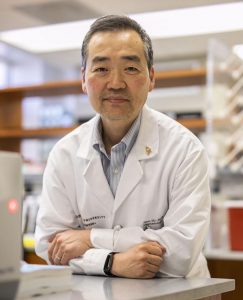Warm welcome
November 7, 2022
 I’m excited as the new director of the Vanderbilt-Ingram Cancer Center to share with you some thoughts and updates. I have already experienced warm welcomes from so many of you in this new role, and it has reminded me how truly special our cancer center is. Thanks to all of you for making my transition efficient, painless and yes, even fun!
I’m excited as the new director of the Vanderbilt-Ingram Cancer Center to share with you some thoughts and updates. I have already experienced warm welcomes from so many of you in this new role, and it has reminded me how truly special our cancer center is. Thanks to all of you for making my transition efficient, painless and yes, even fun!
The title of this publication, Momentum, really speaks volumes of where we are and where we are going to end suffering and deaths from cancer. Our momentum has never been stronger with new discoveries that are translating into new diagnostics and therapies for cancer. Additionally, we are making great strides in addressing health care disparities, reaching out to engage our communities, and developing new ways to positively affect diversity, equity and inclusion. In my opinion, there has never been a more exciting time to be at Vanderbilt-Ingram Cancer Center, and indeed, our future is bright as our momentum carries us forward.
Two of the most prevalent types of cancer that affect Americans are breast cancer and colorectal cancer. This issue of Momentum highlights our research to better understand why and how these cancers develop and our work to develop better and more effective treatments.
Vanderbilt-Ingram Cancer Center has internationally renowned researchers focused on breast cancer and colorectal cancer, and we offer the nation’s best treatment options for these cancers. There are only nine cancer centers in the United States that have Specialized Programs of Research Excellence (SPORE) for gastrointestinal cancers and only nine that have SPORE programs for breast cancer. We are among the nine that merit this funding in each category from the National Cancer Institute (NCI).
The cover story of this issue focuses on our ongoing research to better understand why breast cancer is more deadly for women of African ancestry than other ethnic or racial groups. Our researchers have led the largest-ever study of breast cancer genetics in Black women and have identified many new risk factors. Far fewer studies have been conducted to analyze breast cancer risks in women of African ancestry compared to women of other ethnic groups. We are committed to addressing this disparity.
We are making progress in the treatment of colorectal cancers because of the discoveries and innovations that have been made by our colorectal cancer researchers. We look back on their achievements over the 20-year time frame they have merited SPORE funding from the NCI. We look forward in another article focused on promising new therapies that are on the horizon because of international and national clinical trials led by Vanderbilt oncologists. In the “My Story” feature, Mary Jo Wiggins shares her journey with colorectal cancer and advocates for people to be aware of symptoms and to undergo screenings.
Our mission at Vanderbilt-Ingram Cancer Center is not limited to cancer research and treatment. We recognize that education and community outreach are crucial to lessening the burden of cancer. Another article details our work to reach diverse groups within the large area that we serve.
We cannot fulfill our mission alone. We need partners, people like Charlotte Ladd, a dedicated volunteer profiled in this issue. I want all of our partners who donate their time and resources to know how much we appreciate you. We need you to continue making progress, so that people with cancer can have longer and better lives, and ultimately find new cures for this disease. Thank you.
